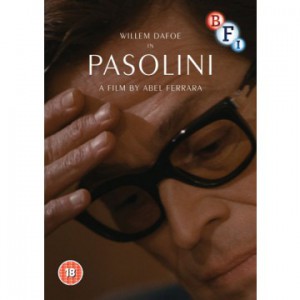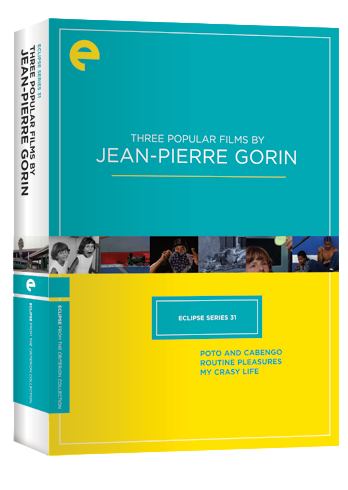
I can easily understand why some of Abel Ferrara’s biggest fans have certain reservations about his Pasolini (2014), available now on a splendid Region 2 Blu-ray from the BFI. Even if it’s a solid step forward from the stultifying silliness of Welcome to New York (2014), it lacks the crazed, demonic poetry of Bad Lieutenant (1992), The Addiction (1995), and New Rose Hotel (1998); most disconcertingly, it’s a responsible, apparently well-researched treatment of one of the most irresponsible of film artists, made by another film artist generally cherished for his own irresponsibility. And stylistically, it’s almost as if Ferrara has moved from being the great-grandson of F.W. Murnau to being the grandson of Vincente Minnelli—although one could argue, more precisely, that it isn’t really an auteur film at all. Yet as a portrait of the great and uncontainable Pier Paolo Pasolini, filtered through the last day of his life—a day focused on new creative work (a novel in progress and a film in pre-production) as well as various other activities, at home and on the street—it carries an undeniable conviction and emotional authenticity, which might make the prosaic strengths of Lust for Life (1956) a more useful model for Ferrara’s ambitions here than the poetic flourishes of a Faust (1926) or Tabu (1931). Read more
From the Spring 2012 issue of Cinema Scope. Some of the facts here may be out of date, so prospective customers should proceed with caution. — J.R.

The arrival on DVD of Jean-Pierre Gorin’s three solo features — Poto and Cabengo (1980), Routine Pleasures (1986), and My Crasy Life (1992) — has been long overdue, and it’s possible that part of the delay can be attributed to how unclassifiable and original these nonfiction films really are. The first of these has something to do with young twin sisters who were believed to have developed a private language between them, the second has something to do with both Manny Farber (as both a painter and a film critic) and a group of model train fans, and the third has something to do with the members of a Samoan street gang. But apart from Gorin’s presence and (quite diverse) Southern California settings, they’re very hard to describe or encapsulate, much less generalize about as a “trilogy” in any ordinary sense, which is part of their enduring fascination. (The same is true, mutatis mutandis, of Chris Marker’s Sans soleil [1982], which roams freely across the planet, already available with La jetée [1962] on a Criterion DVD and now out on a Criterion Blu-ray with the same materials — including terrific monologues by Gorin about both films that show how finely attuned he is to their special qualities, both as a friend of Marker and as a film essayist in his own right.) Read more
From the Chicago Reader (June 10. 2005). — J.R.

Cinderella Man
*** (A must see)
Directed by Ron Howard
Written by Cliff Hollingsworth and Akiva Goldman
With Russell Crowe, Renee Zellweger, Paul Giamatti, Craig Bierko, Paddy Considine, Bruce McGill, and Ron Canada

Ron Howard is an exemplar of honorable mediocrity. His films are conventional and stuffed with cliches, but their nice-guy liberalism is more sincere and nuanced than their tropes would lead one to expect. In his better efforts — Night Shift, Far and Away, Parenthood, The Paper, and now Cinderella Man — the sense of conviction is so passionate that the truth behind the cliches periodically emerges.
This is Howard’s first feature since the award-winning A Beautiful Mind, and the storytelling is fluid and gripping. He has plenty of cliches to peddle about boxing and working-class virtues in the midst of deprivation during the Depression, and the visual rhetoric in which he couches those cliches even give them a metaphysical dimension. The decor is as underlit as it is in Million Dollar Baby, and the cinematography’s even more mannerist in fetishizing darkness to project an aura of doom and desperation. In the deftly staged prizefight sequences, Howard goes even further than Clint Eastwood did in rendering subjective impressions in expressionistic terms. Read more




